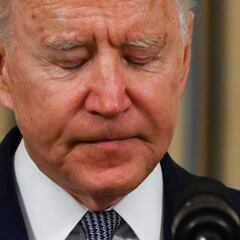Why didn't the Biden administration push back on the expiration of unemployment benefits?
The president has come under fire from progressives in his party after his half-hearted plea for states to keep the benefits after they expired federally.


The final day of the expanded unemployment benefits has passed. Nearly 10 million Americans will see their support vanish this week, extremely troublesome in a time of high covid-19 levels and the resumption of evictions. We look at some of the reasons why the administration has been more than hesitant about calling for the extra benefits to continue, including the long-term democratic economic plan post-covid-19.
Longer-term plans for growth
The Democrat party is currently dealing with the difficulty of passing the $1 trillion infrastructure bill through the House, as well as the protracted negotiations that will arise with the $3.5 trillion budget reconciliation package. These two huge plans are Biden's long-term hopes for economic and job growth.
The infrastructure bill is primarily aimed at rejuvenating the lackluster infrastructure around the US, including significant investment in passenger rail. Accompanying this investment will be an uptick in jobs in the sectors that are involved in these projects.
Or maybe we hit the “cancel” button on this so-called “bipartisan” charade of an Exxon lobbyist drafted infrastructure bill unless we actually pass a law that helps people’s lives with healthcare expansion, childcare, climate action, etc. https://t.co/85Uio8GyWz
— Alexandria Ocasio-Cortez (@AOC) September 2, 2021
The budget reconciliation package does not yet have concrete proposals in the public sphere, these will come by September 15, but the allocation of the budget gives some pointers to where the priorities are. Amongst these are, childcare, public housing investments and assistance for ethnic minorities in education. Unemployment support in its emergency form is not expected, but progressive Democrats will be pushing for measures to help plug the gap left behind.
Many of the measures are aimed at families in the US and it is likely that single Americans will slip through the gaps left after the end of the extra benefits.
Related news:
- Why do experts think the August jobs report was so bad?
- How many Americans will lose federal unemployment aid?
- What financial aid is available in each state?
- Why wasn't there more job growth in the US labor market according to reports?
Biden's Child Tax Credit child is the major policy for lower to middle income groups
The president has staked a lot of political capital in backing the Child Tax Credit. A series of monthly payments for those with qualifying children, they were first mooted with the third stimulus package back in March and they began in July. The reach of the payments is incredibly vast, and they are covering more than 90% of American families. Although they are only due to last until mid-2022, there are plans in the works to continue the payments until 2025.
It was heartwarming to sit down with families who are receiving the expanded Child Tax Credit and hear how the extra money is making a difference for their families. https://t.co/eQScI53x1A
— Reverend Raphael Warnock (@ReverendWarnock) September 4, 2021
The credit has also already proven to be a great help for American families. In recent surveys, more than half of people asked said they made a huge difference. The credit has also led to a decline in hunger rates amongst US children.
Once again, this is specifically targeted at families and long-term unemployed without children will still be at risk.
It is seen as unsustainable by senior people in the administration
Critics of the extra unemployment payments have long thought that they are contributing to a slowing of the return to the workplace. Although evidence of this is currently the opposite, the extreme slowdown in jobs in August compared to July will have alarm bells ringing in the administration's heads. It was estimated that 725,000 new jobs would be created, but the reality was just over a third of that, 235,000.
Biden has called on states with high unemployment rates to use federal funds for pandemic recovery to support the jobless, but no state has taken up this offer.
Related stories
With the long-term planning described above, there is little appetite in the administration to use extra benefits to potentially keep people away from the workplace. Although it is regularly cited that covid-19 and child care are the biggest factors stopping people going back to work instead of benefits, the support has ended.
In the future, it can't be ruled out that more unemployment support will be issued, due to a predicted covid-19 spike in winter that could lead to further business closures.

